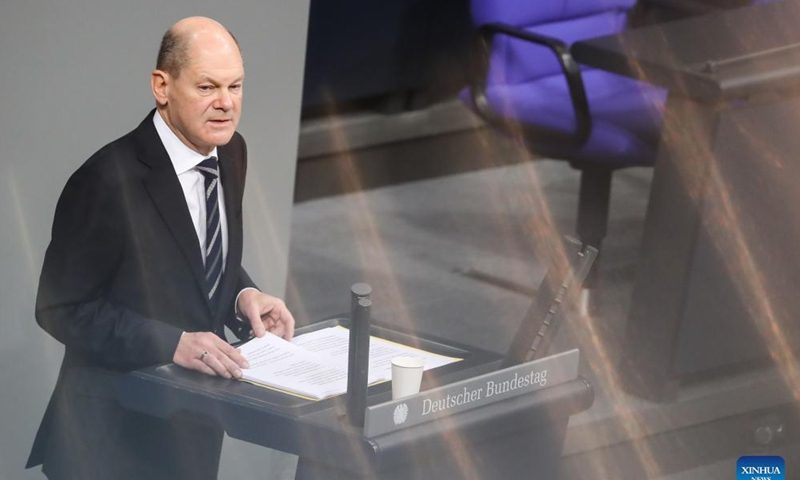
German Chancellor Olaf Scholz delivers his first government statement at the Reichstag building in Berlin Dec. 15, 2021, after he was elected as the new federal chancellor Dec. 8.(Photo:Xinhua)
An election in Germany's most populous state on Sunday poses an early test for Chancellor Olaf Scholz's Social Democrats five months after he took office with a domestic policy focus that was quickly eclipsed by the Ukraine crisis.
"North Rhine-Westphalia always sends an important signal for federal politics," Nico Siegel, executive director of pollster Infratest dimap, said in a statement.
The center-left Social Democrats (SPD) dominated North Rhine-Westphalia (NRW) - home to more than a fifth of Germany's population and to the rust-belt Ruhr region - for most of the past half century.
But the party lost to former chancellor Angela Merkel's conservatives (CDU) in its worst state election in 2017, under attack for its failure to tackle traffic jams and a rising crime rate. A few months later, it also suffered a record defeat at the federal level.
Ahead of Sunday's vote, the two parties were very close in the polls, with the CDU having a slight lead at 32 percent versus 28 percent for the SPD in a survey published by INSA on Thursday.
"An election victory would radiate, in a positive sense, into discussions about the SPD's strength in the federal government and Olaf Scholz's popularity," Siegel said.
The NRW election is also seen giving a boost to Germany's environmentalist Greens party, which could become kingmaker.
The CDU has governed the state in a coalition with business-friendly FDP since 2017. But even with its slight lead over the SPD, it might not be able to secure a majority with just the FDP, which stood at 8 percent in the polls.
The Greens most recently polled around 16 percent, which means either party is likely to need the Greens to form a state government.
Last week, the CDU won by a landslide in the considerably smaller northern state of Schleswig-Holstein, but in NRW it will have a much harder time securing votes.
Local issues such as affordable rents and public transport are usually what determines voters' decisions in state elections.
AFP




